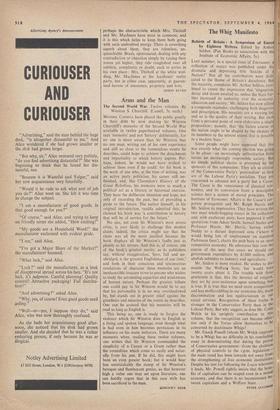The Whig Manifesto
Rebirth of Britain : A Symposium of Essi by Eighteen Writers. Edited by Arth Seldon. (Pan Books in association with I Institute of Economic Affairs, 5s.)
YS ur he
LAST summer, in a special issue of Encounter, a collection of essays was published under tile dramatic and depressing title 'Suicide of a Nation?' Not all the contributors were dedi- cated to the theme of Britain's decadence. But the majority, complains Mr. Arthur Seldon, com- bined to create the impression that 'stagnation, decay and doom awaited us, unless the State fur- ther increased its authority over the economy, education and society.' Mr. Seldon has now edited a composite rejoinder, challenging both diagnosis and prescription. His essayists are a varying lot, and so is the quality, of their writing. But each from a personal point of view elaborates a single proposition : namely, that 'the future course of the nation ought to be shaped by the choices of its members to the utmost extent that is possible in a modern State.'
Some people might have supposed that this was exactly what the coming election was going to be about—an increasingly authoritarian State versus an increasingly responsible society. But no simple political choice is presented by the sponsors. of this symposium. They are as critical of the Conservative Party's 'paternalism' as they are of the Labour Party's socialism. They re concerned to advance not a party but a Cause. The Cause is the renaissance of classical eco- nomics, and its conversion from a descriptive science into a system of moral principles. The Institute of Economic Affairs is the Cause's cor- porate protagonist and Mr. Ralph Harris and Mr. Seldon its impresarios. They have written the two most whole-hogging essays in the collection and, with exuberant piety, have peppered it with quotations from Adam Smith, Samuel Smiles and Professor Hayek. Mr. Harris, having exiled Neddy to a distant depressed area (where it would bring lots of employment on standard Parkinson lines'), charts the path back to an open competitive economy. He advocates that over the Course of the next five years we should cut government expenditure by £1 ,000 million, and abolish subsidies to industry and agriculture. Mr. Seldon is more modest. He wishes to dis- mantle the Welfam State, but would take twenty years about it. The trouble with these gentlemen is that, like the heretics of religicn, they err by over-insistence upon something that is true. It is true that we need more competition and less mollycoddling in our economic life, more discrimination and less egalitarianism in cur social services. Recognition of these truths is stronger in the Conservative Party than itt the Labour Party. But why suggest, as does Mr. Coll Welch in his sprightly contribution to this volume, that the recognition can become effa- tive only if the Tories allow themselves to he converted by doctrinaire Whigs?
Mr. Enoch Powell (whom Mr. Welch supP01 to be a Whig) has no difficulty in his concludi essay in demonstrating that during the per' of Conservative government—from the aboliti of physical controls to the r.p.m. legislation-- the main trend has been towards not away from the strengthening of free economic institutiol s. Despite his zest for following the Logos where' eer. it leads, Mr. Powell rightly insists that the bet fits of capitalism can be reaped even in a mige economy, and that there is no inconsistency be tween capitalism and a Welfare State.
eS ng od on
PETER GOLDMAPI






































 Previous page
Previous page